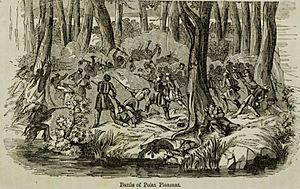Battle of Point Pleasant facts for kids
Quick facts for kids Battle of Point Pleasant |
|||||||
|---|---|---|---|---|---|---|---|
| Part of Dunmore's War | |||||||
 Battle of Point Pleasant, John Frost |
|||||||
|
|||||||
| Belligerents | |||||||
| Shawnee Mingo |
|||||||
| Commanders and leaders | |||||||
Thomas Buford † |
Cornstalk Pukeshinwa † Blue Jacket |
||||||
| Strength | |||||||
| 1,000 | 300–500 | ||||||
| Casualties and losses | |||||||
| ~75 killed ~140 wounded |
+41 killed |
||||||
|
Point Pleasant Battleground
|
|||||||
| Lua error in Module:Location_map at line 420: attempt to index field 'wikibase' (a nil value). | |||||||
| Location | SW corner of Main and 1st Sts., Point Pleasant, West Virginia | ||||||
| Area | 5.3 acres (2.1 ha) | ||||||
| Built | 1774 | ||||||
| NRHP reference No. | 70000656 | ||||||
| Added to NRHP | January 26, 1970 | ||||||
The Battle of Point Pleasant was a big fight that happened on October 10, 1774. It was the only major battle in a conflict called Dunmore's War. This battle took place near what is now Point Pleasant, West Virginia. It was fought between the Virginia militia and warriors from the Shawnee and Mingo nations.
The Shawnee chief, Cornstalk, led his warriors against the Virginia soldiers. The Virginians were led by Colonel Andrew Lewis. Chief Cornstalk hoped to stop the Virginians from moving further into the Ohio Valley. After a long and intense battle, Cornstalk's forces had to retreat. This battle helped lead to a peace treaty that ended the war.
Planning the Attack
Colonel Andrew Lewis was in charge of about 1,000 Virginia soldiers. His group was part of a bigger plan to enter the Ohio Valley. Lewis's soldiers were marching along the Kanawha River. They planned to meet up with another group of soldiers. This second group was led by Lord Dunmore. He was the Royal Governor of Virginia.
Lord Dunmore wanted to make the Native American groups agree to a border. This border was along the Ohio River. It had been discussed in a treaty in 1768. This treaty was called the Treaty of Fort Stanwix.
Why the Shawnee Fought
The Shawnee people were not part of the 1768 treaty. Many of them did not want to give up their lands south of the Ohio River. They were ready to fight for their homes. British officials tried to keep the Shawnee from getting help from other groups. Because of this, the Shawnee had only a few allies, mainly some Mingo warriors.
Chief Cornstalk, the Shawnee leader, decided to attack Lewis's army. He wanted to stop the two Virginia armies from joining together. Historians believe Cornstalk had between 300 and 500 warriors. This meant he was outnumbered by the Virginians. A famous future Shawnee leader, Blue Jacket, might have been in this battle too.
The Battle Begins
Cornstalk's warriors attacked Lewis's camp early in the morning. The camp was located where the Kanawha River meets the Ohio River. The Shawnee hoped to trap the Virginians against a steep bank. The fighting was very fierce and lasted for many hours. At times, the battle was hand-to-hand.
People said they could hear Chief Cornstalk's voice during the fight. He was shouting to his warriors to "be strong!" Colonel Lewis sent some of his soldiers to attack the Shawnee from behind. This surprise move helped to slow down the Shawnee attack. As night came, the Shawnee quietly pulled back. They crossed the Ohio River. The Virginians had held their ground, so they were seen as the winners of the battle.
What Happened After
The Virginians lost about 75 soldiers who were killed. Around 140 more were wounded. It was hard to know how many Shawnee warriors were lost. They carried away their wounded, and many of their dead were put into the river. The next morning, 21 dead warriors were found. Twelve more were found quickly covered with branches. Among those killed was Pucksinwah, who was the father of the famous leader Tecumseh.
The Battle of Point Pleasant made Chief Cornstalk agree to a peace treaty. This treaty was called the Treaty of Camp Charlotte. In this treaty, the Shawnee gave up their claims to all lands south of the Ohio River. This area includes parts of what are now Kentucky and West Virginia. The Shawnee also had to return any white captives. They also agreed to stop attacking boats on the Ohio River.
 | Selma Burke |
 | Pauline Powell Burns |
 | Frederick J. Brown |
 | Robert Blackburn |

